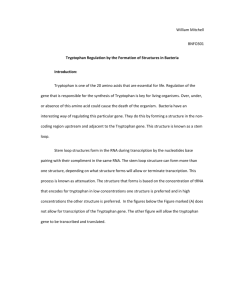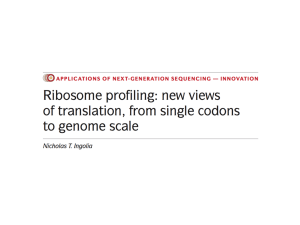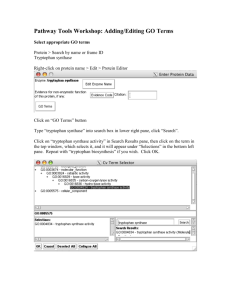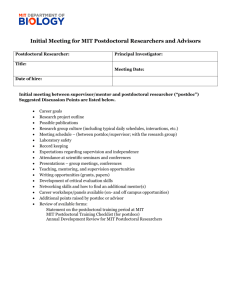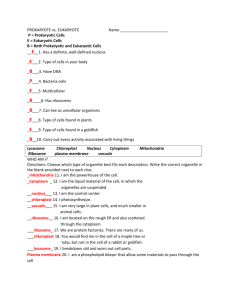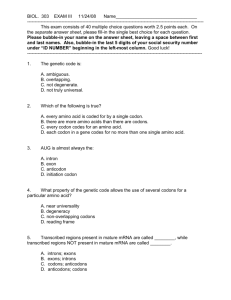Research Support - The University of Alabama in Huntsville
advertisement
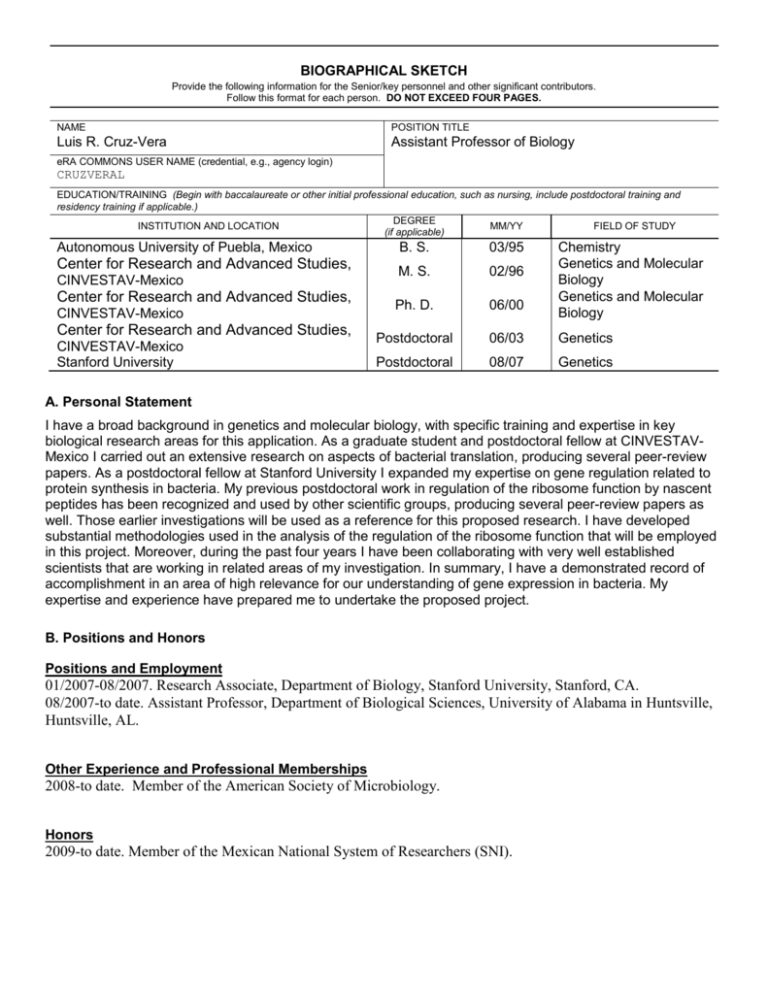
BIOGRAPHICAL SKETCH Provide the following information for the Senior/key personnel and other significant contributors. Follow this format for each person. DO NOT EXCEED FOUR PAGES. NAME POSITION TITLE Luis R. Cruz-Vera Assistant Professor of Biology eRA COMMONS USER NAME (credential, e.g., agency login) CRUZVERAL EDUCATION/TRAINING (Begin with baccalaureate or other initial professional education, such as nursing, include postdoctoral training and residency training if applicable.) DEGREE INSTITUTION AND LOCATION MM/YY FIELD OF STUDY (if applicable) Autonomous University of Puebla, Mexico Center for Research and Advanced Studies, CINVESTAV-Mexico Center for Research and Advanced Studies, CINVESTAV-Mexico Center for Research and Advanced Studies, CINVESTAV-Mexico Stanford University B. S. 03/95 Chemistry Genetics and Molecular Biology Genetics and Molecular Biology M. S. 02/96 Ph. D. 06/00 Postdoctoral 06/03 Genetics Postdoctoral 08/07 Genetics A. Personal Statement I have a broad background in genetics and molecular biology, with specific training and expertise in key biological research areas for this application. As a graduate student and postdoctoral fellow at CINVESTAVMexico I carried out an extensive research on aspects of bacterial translation, producing several peer-review papers. As a postdoctoral fellow at Stanford University I expanded my expertise on gene regulation related to protein synthesis in bacteria. My previous postdoctoral work in regulation of the ribosome function by nascent peptides has been recognized and used by other scientific groups, producing several peer-review papers as well. Those earlier investigations will be used as a reference for this proposed research. I have developed substantial methodologies used in the analysis of the regulation of the ribosome function that will be employed in this project. Moreover, during the past four years I have been collaborating with very well established scientists that are working in related areas of my investigation. In summary, I have a demonstrated record of accomplishment in an area of high relevance for our understanding of gene expression in bacteria. My expertise and experience have prepared me to undertake the proposed project. B. Positions and Honors Positions and Employment 01/2007-08/2007. Research Associate, Department of Biology, Stanford University, Stanford, CA. 08/2007-to date. Assistant Professor, Department of Biological Sciences, University of Alabama in Huntsville, Huntsville, AL. Other Experience and Professional Memberships 2008-to date. Member of the American Society of Microbiology. Honors 2009-to date. Member of the Mexican National System of Researchers (SNI). C. Selected Peer-reviewed Publications (Selected from 18 peer-reviewed publications) Most relevant to the current application 1. Cruz-Vera, L.R., Rajagopal, S., Squires, C., and Yanofsky C. (2005) Features of ribosome-peptidyl-tRNA interactions essential for tryptophan induction of tna operon expression. Mol. Cell. 19: 333-343. 2. Cruz-Vera, L.R., Gong M., and Yanofsky C. (2006). Changes produced by bound tryptophan in the ribosome peptidyl transferase center in response to TnaC, a nascent leader peptide. Proc. Natl. Acad. Sci. U.S.A. 103: 3598-3603. 3. Cruz-Vera, L.R., New, A., Squires, C. and Yanofsky C. (2007). Ribosomal features essential for tna operon induction: tryptophan binding at the peptidyl transferase center. J. Bacteriol. 189: 3140-3146. 4. Cruz-Vera, L.R. and Yanofsky C (2008). Conserved residues Asp16 and Pro24 of TnaC-tRNAPro participate in tryptophan induction of tna operon expression. J. Bacteriol. 190:4791-4797. 5. Yang, R., Cruz-Vera L.R., and Yanofsky, C. (2009). 23S rRNA nucleotides in the peptidyl transferase center are essential for tryptophanase operon induction. J Bacteriol. 191:3445-3450. 6. Cruz-Vera, L.R., Yang, R. and Yanofsky C. (2009). Tryptophan inhibits Proteus vulgaris TnaC leader peptide elongation, activating tna operon expression. J. Bacteriol. 191: 7001-7006. 7. Martinez, A. K., Shirole, N. H., Murakami, S., Benedik, M. J., Sachs, M. S. and Cruz-Vera, L.R. (2011). Crucial elements that maintain the interactions between the regulatory TnaC peptide and the ribosome exit tunnel responsible for Trp inhibition of ribosome function. Nucleic Acid Res. 40: 2247-2257. Additional recent publications of importance to the field (in chronological order) 1. Cruz-Vera, L. R., Toledo I., Hernández-Sánchez, J. and Guarneros, G. (2000). Molecular Basis for the Temperature Sensitivity of Escherichia coli pth(Ts). J. Bacteriol. 182:1523-1528. 2. Cruz-Vera, L. R., Galindo, J.M. and Guarneros, G. (2002). Transcriptional analysis of peptidyl-tRNA hydrolase gene in Escherichia coli. Microbiol. 148: 3457-3466. 3. Rosas-Sandoval, G., Ambrogelly, A., Rinehart, J., Wei, D., Cruz-Vera, L. R., Graham, D. E., Stetter, K. O., Guarneros, G. and Söll, D. (2002). Orthologs of a novel archaeal and of the bacterial peptidyl-tRNA hydrolase are nonessential in yeast. Proc. Natl. Acad. Sci. U.S.A. 99: 16707-16712. 4. Cruz-Vera, L.R., Hernández-Ramón, E., Pérez-Zamorano., B. and Guarneros, G. (2003). The rate of peptidyl-tRNA dissociation from the ribosome during minigene expression depends on the nature of the last decoding interaction. J. Biol. Chem. 278: 26065-26070. 5. Cruz-Vera, L.R., Magos-Castro MA, Zamora-Romo E, and Guarneros G. (2004) Ribosome stalling and peptidyl-tRNA drop-off during translational delay at AGA codons. Nucleic Acid Res. 32: 4462-4468. 6. Vivanco-Dominguez, S., Cruz-Vera, L.R., and Guarneros G. (2006). Excess of charged tRNALys maintains low levels of peptidyl-tRNA hydrolase in pth(Ts) mutants at a non-permissive temperature. Nucleic Acid Res. 15:1564-1570. 7. Zamora-Romo, E., Cruz-Vera, L.R., Vivanco-Domínguez, S., Magos-Castro, M.A. and Guarneros, G (2007). Efficient expression of gene variants that harbour AGA codons next to the initiation codon. Nucleic Acid Res. 35:5966-5974. 8. Gong, M., Cruz-Vera, L.R., and Yanofsky, C. (2007). RRF and RF3 action promotes TnaC-peptidyl-tRNA drop-off and relieves ribosome stalling during tryptophan induction of tna operon expression in E. coli. J. Bacteriol. 189:3147-3155. 9. Cruz-Vera, L.R., Gong, M and Yanofsky C (2008). The physiological effects of AT protein activity and tRNATrp charging on trp operon expression in Bacillus subtilis. J. Bacteriol. 190:1937-1945. 10. Harris, S.M., MacFeeters, H., Ogungbe, I.V., Cruz-Vera, L.R., Setzer, W.N., Jackes, B.R., MacFeeters, R.L. (2011). Peptidyl-tRNA hydrolase screening combined with molecular docking reveals the antibiotic potential of Syzygium johnsonii bark extract. 6: 1421-1424. Research Support Ongoing Research Support None Completed Research Support UAHuntsville Research Infrastructure Investment (URII) Cruz-Vera (PI) 05/01/10-04/31/11 Pth: the new generation of antimicrobial antibiotics The goal of this project was to isolated compounds from plant extracts that inhibit the E. coli Pth activity. Role: PI
